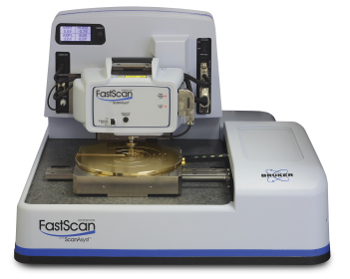Bruker has established a collaborative partnership with the University of Manchester’s new National Graphene Institute (NGI) to leverage the benchmark speed, resolution and performance of the Dimension FastScan® Atomic Force Microscope (AFM) for research into the nanofabrication and nanoscale properties of graphene.
 Bruker Dimension FastScan AFM®
Bruker Dimension FastScan AFM®
Graphene, the world’s thinnest, strongest and most conductive material, was first isolated and characterized at The University of Manchester by Professor Andre Geim and Professor Kostya Novoselov, who were awarded the Nobel Prize for Physics in 2010 for their research. This transparent, one-atom thick flat sheet of carbon has the potential to revolutionize technology, from smartphones and ultrafast broadband to drug delivery and computer chips. Bruker’s unique PeakForce TUNATM and PeakForce KPFMTM nanoelectrical AFM modes are anticipated to provide important new insights into nanoscale variations of graphene conductivity and work function. Coupled with simultaneous quantitative mapping of mechanical properties enabled by Bruker’s exclusive PeakForce QNM® AFM mode, NGI researchers hope to uncover new information that will ultimately optimize the performance of new graphene-based materials and devices.
“Bruker’s Dimension FastScan provides our team with the best available technology to support the complex demands for sub-nanometer observations of graphene,” said Nobel Prize winner Professor Novoselov. “The unmatched speed and unique property mapping modes of FastScan will benefit many researchers across our institute and its partners. One of our key goals is to benefit from collaborative partnerships with leading global industry innovators, and we are very much looking forward to partnering with Bruker’s team of AFM innovators and application scientists.”
“It is clear that the world-class research team at The University of Manchester and its National Graphene Institute is a leader in graphene research and we are delighted that they have selected Bruker AFM systems to enable their work,” added David V. Rossi, Executive Vice President and General Manager of Bruker's AFM Business. “It is also pleasing to see that the Dimension FastScan and Bruker’s new proprietary nanoelectrical AFM modes are being used to accelerate graphene research and its technological applications.”
About Dimension FastScan
The Dimension FastScan system utilizes a revolutionary XYZ closed-loop head that scans at high-speed rates while delivering extremely low drift and low noise to make atomic force microscopy easier to use and more productive. These features combine to drastically cut stabilization times, allowing the system to acquire nanoscale data hundreds of times faster than is possible with any other AFM on the market. A new fast scanner, a high-resolution camera, as well as automated laser and detector alignment, and integrated feedback alignment tools deliver faster probe positioning and sample navigation, thus allowing users to more easily locate features of interest. Finally, the software offers an intuitive workflow, while default experiment modes distill advanced AFM processes into preconfigured settings.
About the UK National Graphene Institute
The National Graphene Institute at The University of Manchester, UK, is set to open in 2015, creating around 100 new jobs in a new, 7,800 square meter facility that will house state-of-the-art facilities, including two cleanrooms. The Institute will also feature a 1,500 square meter research lab for University of Manchester graphene scientists to collaborate with their colleagues from industry and other universities.
About Bruker Corporation
Bruker Corporation (NASDAQ: BRKR) is a leading provider of high-performance scientific instruments and solutions for molecular and materials research, as well as for industrial, diagnostics and applied analysis. For more information about Bruker Corporation, please visit www.bruker.com.